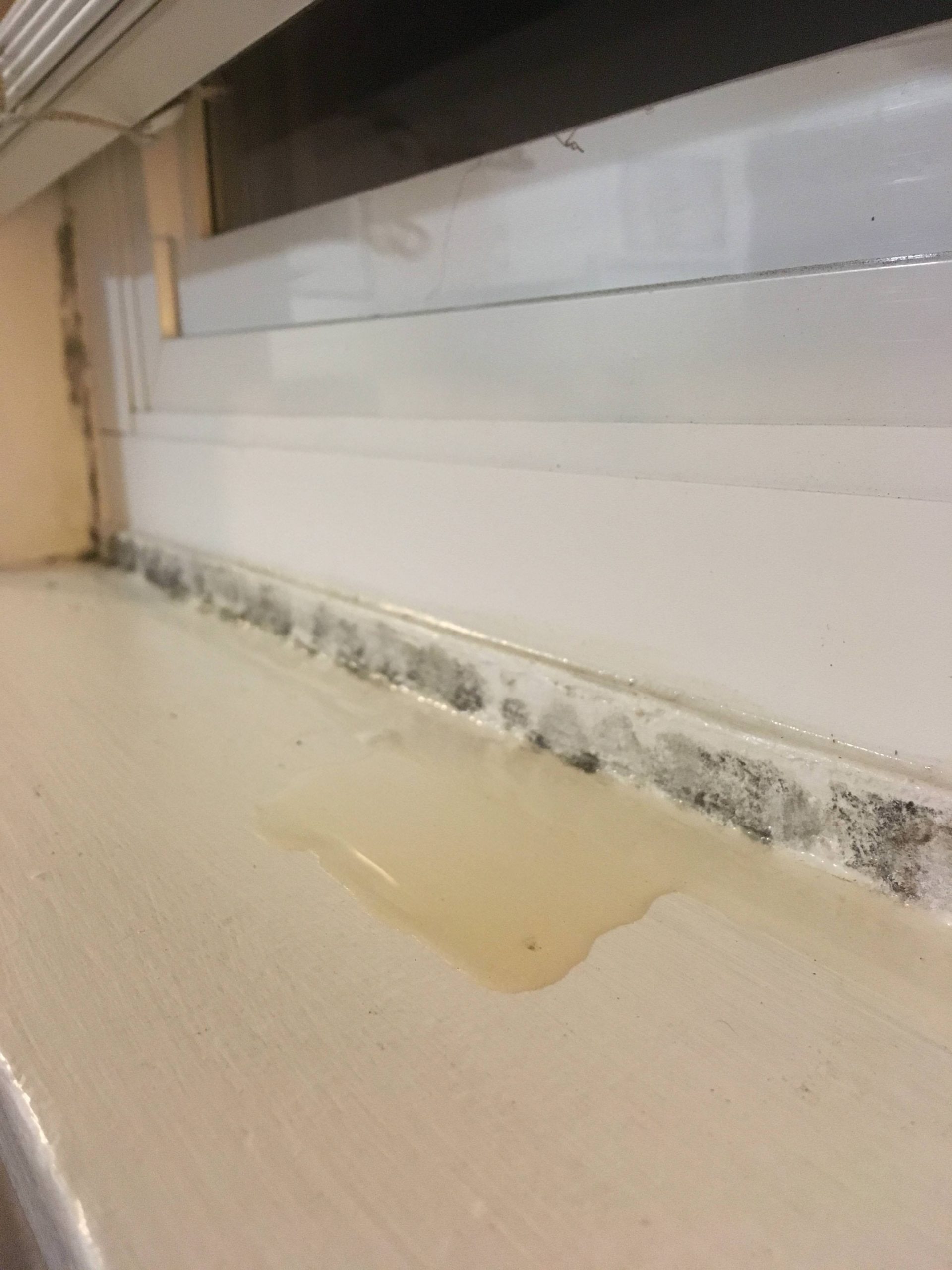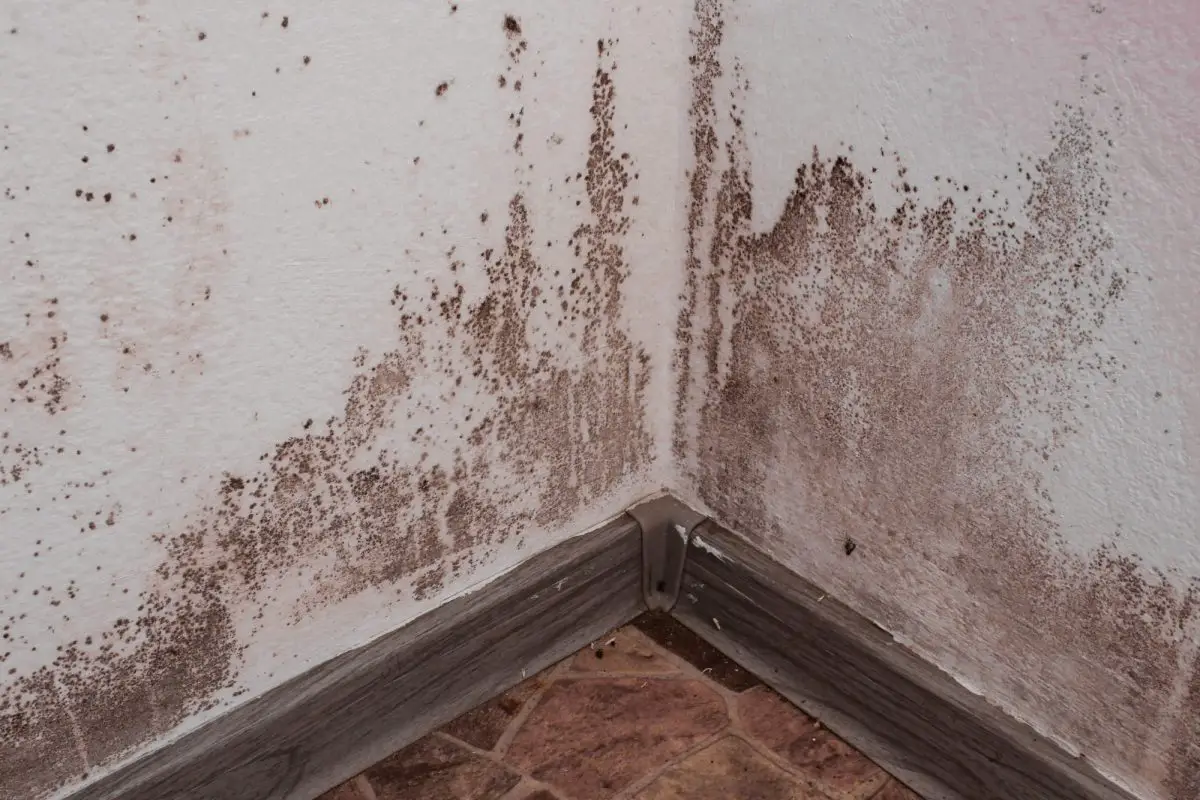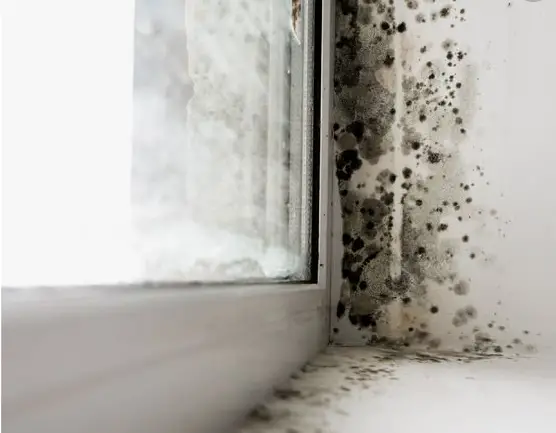Remove Mold From The Base: Check Humidity
Another very important factor for the formation of mould is the relative humidity in the room. First of all: what information is hidden behind the term relative humidity?
The air can only absorb a certain amount of water vapour, and this amount depends on the temperature. A cubic meter of air at a temperature of 0 degrees Celsius, for example, can absorb 5 grams of water vapor. The amount increases with temperature, and so a cubic meter of air at 30 degrees Celsius can already absorb 30 grams of water vapor.
The relative humidity always refers to the percentage of air load . If there is 30 grams of water in one cubic meter of air at 30 degrees Celsius, then the relative humidity is 100%. For 15 grams of water 50% accordingly. When the air is saturated, the gaseous state of the water cannot be maintained and drops of liquid are formed. This condensation, but also relative humidity values of over 70%, favour mould extremely, from 80% it is practically unavoidable.
The exact values shown in the following table should be observed for the individual rooms.
dtd> 40% 60%
| Bathroom |
| cellar |
You need a hygrometer to measure relative humidity. This allows you to read the relative humidity in the living rooms at any time.
Tenant Laws And Mold In A Rental
Tenant laws enter into new territory from mold laws.
All states will allow a tenant to take legal action if a habitable environment is not provided by the landlord. Landlords in all states but Arkansas are responsible for maintaining fit and habitable housing and repairing rental property, and this extends to fixing leaking pipes, windows, and roofs.
If the landlord doesnt take care of leaks and mold grows as a result, you might be able to hold the landlord responsible if you can convince a judge or jury that the mold has caused a health problem. Theres a but
While this is on a case by cases bases, most of the time the mold growth has to occur while you are living in the rental. If the landlord failed to fix a previous leak in a timely manner or because proper remediation was not completed you may not have a claim. You may have mold growing behind your walls and not know. Your health might be impacted. But you probably cant do anything about it legally. Unless.
Visible mold begins to grow OR you take matters into your own hands as a tenant and hire a professional mold inspector to assess the mold in a rental. More on that in a minute.
Follow These Steps For Thorough Mold Remediation:
You May Like: Ozone Machine To Kill Mold
S To Avoid Mold Problems When Renting An Apartment In Georgia
One of the biggest steps you can take to avoid mold concerns is to properly research your rental before committing to a lease with a landlord.
Consider these factors in your research:
- Basement apartments tend to be more prone to damp and moisture issues, so if mold is a concern, you may want to avoid renting this type of unit.
- If you are renting in a multi-story building, find out if there have been any flooding issues in the basement. If so, best to avoid renting because if the building had a wet basement, there could be mold growing and since the HVAC system is located in the basement, mold spores will circulate in all units.
- Check the unit for bathroom and kitchen fans. If there are none, then do not rent the unit because the building will likely have moisture issues and mold.
- Ideally, rent a unit without carpet. However, if you are considering renting a unit with carpet, find out how old it is and if possible, get the landlord to change it before you move in.
- Try to find out as much about the building history, specifically, does the building have a history of roof or plumbing leaks. If so, avoid renting because there will undoubtedly be mold.
Bottom line, as the tenant you are the customer of the landlord, so you have the right to choose who you rent from and should do your due diligence before you rent.
Steps To Avoid Mold Problems When Renting An Apartment
When Does Mold Become Harmful To Health

According to information provided by the federal Environmental Protection Agency, the Centers for Disease Control, and the NYC Department of Health, most molds that grow in small quantities are harmless for healthy people but obvious mold growths in homes or work places should be cleaned up immediately.
Some molds can be very harmful to humans, especially young children, the elderly, and those with compromised immune systems. Even healthy people can develop severe illnesses and allergies when exposed to large mold growths. Illnesses related to mold growth include allergic reactions , asthma, and severe respiratory problems.
Tenants around the country have complained for years about very severe illnesses, including hemorrhaging lungs, caused by mycotoxins which are chemicals produced by some harmful molds. In large quantities, according to some sources, mold mycotoxins can induce allergies and chronic, severe health problems in previously healthy people.
Read Also: How To Clean Mold In Basement
How Can I Get Help In Fighting For Decent Services And Conditions In My Apartment
Contact other tenants in the building if you think that mold or other issues are building-wide, and join with interested neighbors to pressure your landlord as a group. Read our information sheet on Forming a Tenants Association.
With the possibility of lawsuits and liabilities, you may want to inform the landlords insurance company of the issue. You can also reach out to local elected officials, especially if you are having difficulty getting city agencies to come out for inspections or to follow up with enforcement. Contact Met Council on Housing or a local housing group for help in organizing your building to fight against a landlord who refuses to clean up and make repairs as required by law.
Why Mold Problems Happen
Mold is a type of fungus that relies on a certain set of conditions in order to grow. Its estimated that there are as many as 300,000 species, and each one has its own unique characteristics.
In general, though, most varieties need the following factors to thrive:
- Moisture
- A hot or warm environment
- An optimal growth medium
- Low air movement
When you put these conditions together, youre likely to end up with mold. It can grow either indoors or outdoors, in all types of climates. It will usually do well in a porous growth medium clothing, beds, floors as well as tile grout or caulking. Thats why mold loves to grow in bathrooms, which typically provide all of these growth factors.
But bathroom mold is usually easy to spot what makes mold contamination a problem is when mold spores take root in areas you cant see, such as behind walls and ceiling.
Theres no clear consensus on the effects of mold exposure. Whether a particular mold that you discover is toxic or not depends on the species, along with the types of mycotoxins which may be present. Some varieties such as aspergillus may not cause any symptoms in healthy individuals, while others may cause serious health problems.
In fact, some studies have been unable to prove any link between mold exposure and illness whatsoever, while others suggest it can cause memory loss, lethargy, and other serious conditions.
| Fast, expert commercial mold testing and removal for your commercial or residential building |
Recommended Reading: How To Install Lvp Stair Nose
Landlords Responsibility To Mold Disclosure
Although federal law does not require you to disclose a mold infestation in the property to potential renters, some states do, including California and New York. You should check your state’s legislation to see whether you are required to disclose an issue with mold.
Keep in mind: Even if your state does not demand landlords disclose mold issues, one may be responsible for not disclosing it. A court might see foreknowledge of a potentially hazardous condition caused by mold and the failure to remedy it as a breach of the habitability warranty.
Is Black Mold Dangerous
This type of mold technically goes by the name Stachybotrys chartarum and can cause serious health problems after periods of exposure, including respiratory problems, internal organ damage, mental impairment, nausea, and skin inflammation. Mold also can cause irreparable property damage. And since black mold thrives in dark places lacking ventilation, it usually goes unseen until it’s too late.
Don’t Miss: Installing Stair Nose For Vinyl Plank Flooring
Mold Caused By Tenant Behavior
The liability picture changes when mold grows as the result of your own behavior, such as keeping the apartment tightly shut, creating high humidity, or failing to maintain necessary cleanliness. Tenants have some duties to maintain their rental unit, so when a tenant’s own negligence is the sole cause of injury, the landlord is not liable. To avoid causing any mold problems, practice good housekeeping, such as ventilating your apartment.
What Can You Do About Mold Growing In Your Apartment
We spoke about mold disclosure laws for landlords in California at the beginning of 2021. We touched on health and safety codes, California laws around mold, and what you can do about mold growing in your apartment. Lets expand on that topic some more and discuss how to get rid of mold growth in your apartment.
Recommended Reading: How To Clean Bathroom Ceiling
Headaches Or Memory Problems
When you have mold, mycotoxins present a big concern. Mycotoxins come from toxic mold strains and can cause serious health issues. Symptoms of exposure include:
- Difficulty concentrating.
- Memory loss.
- Short attention span.
As with the allergy symptoms that non-toxic molds can cause, these symptoms can mean mold exists in your unit if they get worse when youre at home.
What Can A Tenant Do If The Landlord Refuses To Fix A Mold Problem

Mold-related legislation is not currently required in every state. Despite this, premises liability and personal injury law still adhere to the principles established by the statutes that govern these matters. That implies negligence is a factor in determining responsibility.To be found liable for negligence in a premises liability claim, someone must have been aware that the issue existed or should have been aware that the problem existed. In some circumstances, negligence can be established circumstantially. It’s not uncommon for landlords to be held responsible for creating a toxic environment if the problem is mold exposure.A mold infestation, on the other hand, will need to be demonstrated.This can be done in the following ways:
Also Check: Cleaning Mildew Off Ceiling
Can You Do A Mold Test On Yourself
Mold spores can be airborne in your home, and to test your air quality, youll need a product like the My Mold Detective Mold Test Kit. This kit comes with an air sampling pump, four air sample cassettes, and one surface sample, and it takes just five minutes to collect a sample from your home.
What To Do If You Have Mold
If there is mold in your apartment, you need to notify your landlord immediately. You might also consider asking your landlord to bring in a professional mold inspector. Mold usually grows in difficult to see places, like behind walls or appliances, and the professionals will have equipment to detect it. Whatever they do to find the mold, though, it is important that you and your landlord work together to get it addressed immediately.
Read Also: How To Remove Mold From Basement
What Do I Do If I Suspect Mold In My Apartment
If a tenant suspects that there is mold in the apartment, it is his/her responsibility to inform the landlord as soon as possible. In turn, it is the landlords responsibility to ensure that the mold issue is addressed properly and within a reasonable time frame. In cases of black mold in a rental house, landlords must act with urgency due to the potential health risks.
The Moldy Apartment Blues Who Is Liable
Mold in rentals is a joint issue of tenant-landlord liability, responsibility, and prevention. If you find mold lurking and seeping in from the corners of your walls, you are living in an environmentally hazardous situation. There are a variety of mold strains that can cause any number of health problems.
You May Like: What Kills Mold On Leather
How Dangerous Is Black Mold
You may have heard the phrase “toxic black mold” in the news and on social media, which makes this greenish-black splotchy mold sound particularly scary. But is it really more dangerous than other types of mold?
“Toxic black mold” is a term often used to refer to Stachybotrys chartarum. Stachybotrys belongs to a class of molds that are toxigenic, meaning they produce a toxic substance called mycotoxins.
Science hasn’t found a causal link between black mold and certain serious health issues, so Stachybotrys isn’t necessarily more dangerous than other types of molds. According to the CDC, all mold problems should be addressed quickly, especially since the presence of mold in your apartment could be a sign of a long-term moisture problem.
Mold In A Basement Apartment
You might not even realize that you are living with mold until you develop symptoms. If you live in a basement apartment, the air could seem dry, but it could be infected with mold thats hidden in the walls, carpets, air vents, window sills, or ceiling tiles.
Mold can grow anywhere that moisture is present for a prolonged period. This means that mold could have grown after previous water damage, before you even moved into your apartment. Now it is hanging around, infecting your air.
Also Check: Fungus On Leather
Can You Live In An Apartment With Mold
If you’ve found mold growing in your apartment, take steps to remove it quickly and prevent the problem from spreading.
Exposure to mold can cause serious health problems for some and few or no issues for others. But whether you’re allergic or not, mold can cause irritation to your eyes, nose, throat, lungs and skin. There are also studies linking mold exposure to an increased likelihood of childhood asthma, so if you have children living in your home, itâs important to be extra diligent with mold removal.
Mold allergies are common. If you’re allergic, you can expect hay fever-like symptoms. In asthmatic people, mold sensitivity can trigger asthma attacks. Similarly, mold may cause breathing problems for those with respiratory diseases. You should also be vigilant for mold if you’re immunosuppressed.
Responsibility Of The Landlord According To The Law

When youfind mold in your apartment, you will obviously expect the landlord to pay forits removal. However, due to the expenses involved, some landlords are lessthan willing to handle the costs.
Lawsregarding landlord liability when it comes to mold vary from state to state andregion to region, so you will want to consult an attorney in your area if youwant to know the specifics that apply in your location.
With only afew exceptions, the responsibilities of a landlord regarding mold are notclearly spelled in building regulations, codes, ordinances, or statutes.However, landlords can be held responsible for issues related to mold even whenthere are no specific laws on the matter.
There are nofederal laws that set permissible amounts of mold or tolerance standards formold in apartment buildings, and only a few states and cities have taken thenecessary steps to establish the tolerance standards for mold and regulationsfor mold present in indoor air.
Even if yourcity or state does not have laws regarding mold, your landlord is required toprovide safe and livable housing. Some of the general regulations in moststates regarding a landlords responsibility regarding mold include:
Recommended Reading: How To Kill Mold On Bathroom Ceiling
